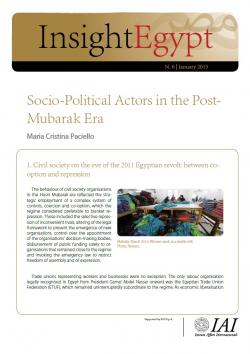Socio-Political Actors in the Post-Mubarak Era
The fall of Mubarak paved the way for union pluralism and the break-up of the Egyptian Trade Union Federation (ETUF) monopoly. However, beyond some initial successes, independent workers' organisations have remained on the side-lines in decision-making processes as well as being exposed to post-revolt authorities' growing use of force and repression, but they have also been weakened by internal problems. On the other hand, the old Mubarak-era ETUF continues to be State-controlled and a point of reference for the post-Mubarak government. As far as the situation of both private sector and business organisations is concerned, since the fall of Mubarak it does not seem to have changed in any significant way. The panorama of business and employer organisations is still dominated by the same organisations that were operating in the Mubarak era. Even during the Islamist administration, whose priority had been to fight the rampant corruption left in Mubarak's wake, opted to preserve the status quo in relations with existing business associations and to maintain a good rapport with businessmen associated with the previous regime. The post-Mubarak era also saw the panorama of businessmen's organisations enhanced by the addition of new associations linked with Islamist parties. However, these associations such as EBDA, who played an important economic and political role during the Morsi administration, employed practices and policies not unlike those of the other business organisations.
-
Details
Roma, Istituto affari internazionali, January 2015, 9 p. -
In:
-
Issue
6
1. Civil society on the eve of the 2011 Egyptian revolt: between co-option and repression
2. Workers' protests of the 2000s and their role in the January 2011 protests
3. The workers movement in the post-Mubarak era
3.1 Independent unions excluded from or co-opted in decision-making processes
3.2 Unions, between repression and infighting
3.3 ETUF link to power apparatus maintained
4. Post-Mubarak entrepreneurs
Topic
Tag
Related content
-
Ricerca27/12/2013
Egypt in transition
leggi tutto



